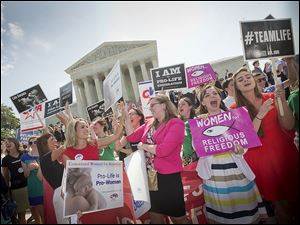
Court lets firms opt out of birth control coverage
Religious objections to health-care law allowed
6/30/2014
Demonstrators react to the Supreme Court’s decision on the Hobby Lobby case outside the building in Washington. Justices ruled 5-4 for the family owned craft-store chain and a cabinet-making business.
WASHINGTON — In a major test of the reach of the Affordable Care Act, the U.S. Supreme Court ruled 5-4 that closely held businesses with religious objections are permitted to opt out of a federal requirement to provide employees insurance coverage for birth control.
The ruling Monday was a cause celebre for the religious right. It also leaves the Obama Administration looking for another way to provide no-cost contraception under the Affordable Care Act in cases when employers object to coverage.
RELATED CONTENT: Local reactions to ruling mirror ideological split of nation
The evangelical Christian owners of the national craft-store chain Hobby Lobby and the Mennonite cabinet-makers who own Conestoga Wood Specialties in Pennsylvania brought the case.
“This is a big win for freedom in a diverse and pluralistic society,” said Hobby Lobby attorney Mark Rienzi. “The court confirmed that Americans don’t give up their religious freedom when they open a family business.”
Advocates for women’s reproductive rights decried the court’s ruling.
Cecile Richards, president of the Planned Parenthood Action Fund, called the decision “stunning” and “dangerous.” She said it allows bosses to make health-care decisions for their female employees.
Justice Samuel Alito, who delivered the court’s opinion, said the government still can compel contraceptive coverage as long as it doesn’t compel religious objectors to pay for it.
He reasoned that the government already has accommodated religious nonprofits that object to the birth-control mandate.
In those cases, rather than the nonprofit paying for the coverage, the insurance company absorbs the cost, and the government is reimbursed through credits toward fees owed under other provisions of the Affordable Care Act.
The Department of Health and Human Services “provided no reason the same system cannot be made available when owners of for-profit corporations have the same religious objections,” Justice Alito said. He said another option would be for government to provide coverage directly.
Justice Ruth Bader Ginsburg, in remarks from the bench, said businesses are different from religious organizations that exist primarily to foster the interests of people of the same faith. She said they should not be treated the same.
“Working for Hobby Lobby or Conestoga should not deprive employees holding different beliefs of the employer-insured preventative care available to workers at the shop next door,” she said.
The White House said it will work with Congress to ensure that women whom the decision affected still would have contraception coverage available.
“President Obama believes strongly in the freedom of religion. That’s why we’ve taken steps to ensure that no religious institution will have to pay or provide for contraceptive coverage, but we believe that the owners of for-profit companies should not be able to assert their personal religious views to deny their employees federally mandated benefits,” White House press secretary Josh Earnest said.
The court’s majority disagreed.
Chief Justice John Roberts and Justices Antonin Scalia and Clarence Thomas joined the majority; Justice Anthony Kennedy filed a concurring opinion.
Justices Ginsburg, Stephen Breyer, Elena Kagan, and Sonia Sotomayor dissented.
Justice Alito specified that the court’s opinion concerns only the contraceptive mandate and should not be used to shield employers from other Affordable Care Act provisions that conflict with their religious beliefs.
Still, the decision’s critics said it opens the floodgates to opt-outs for other medical procedures because of religious objections to transfusions, vaccinations, anti-depressants, or medications derived from pigs, for example.
“What of the employer whose religious faith teaches that it is sinful to employ a single woman without her father’s consent, or married women without [their] husbands’ consent?” Justice Ginsburg asked.
During a conference call later, Mr. Rienzi said that the government could more easily come up with a compelling public reason to mandate emergency blood transfusions than emergency contraception.
Louise Melling, deputy legal director of the American Civil Liberties Union, disagrees.
“Somehow contraception is different from other forms of health care,” said Ms. Melling in her criticism.
The Greens, evangelical Christians who own Hobby Lobby, and the Hahns, Mennonites who own Conestoga Wood Specialties, object to 4 of the 16 forms of birth control that the Affordable Care Act requires to be available for free to women employees.
They include emergency contraception known as the morning-after pill and intrauterine devices that prevent embryos from implanting in uteruses.
Because their religions say life begins at conception, the Greens and Hahns equate the two methods to abortion.
They argued the requirement would violate the 1993 Religious Freedom Restoration Act, which bars the government from restricting the exercise of religion unless doing so furthers an important public interest that cannot be achieved in a less restrictive way.
Marcia Greenberger, co-president of the National Women’s Laws Center, faulted the court for accepting the religious belief that emergency contraception causes abortion even when the medical community disagrees.
Mr. Rienzi said the decision has implications for Catholics and others who object to other types of birth control — or all types — that the Affordable Care Act mandates.
The opinion doesn’t turn on which particular methods employers objected to but on the idea that the government mandate didn’t serve enough of a public purpose to justify violating employers’ religious beliefs.
Ilyse Hogue, president of NARAL Pro-Choice America, characterized the decision as a blow to women.
“We are looking for Congress to right this wrong. We cannot trust the courts,” she said.
Conestoga Wood Specialties is based in Pennsylvania and employs 950 people. Oklahoma-based Hobby Lobby has 600 craft stores and about 15,000 full-time employees.
The Block News Alliance consists of The Blade and the Pittsburgh Post-Gazette. Tracie Mauriello is Washington Bureau Chief for the Post-Gazette.
Contact Tracie Mauriello at: 703-996-9292 or tmauriello@post-gazette.com or on Twitter @pgPoliTweets.